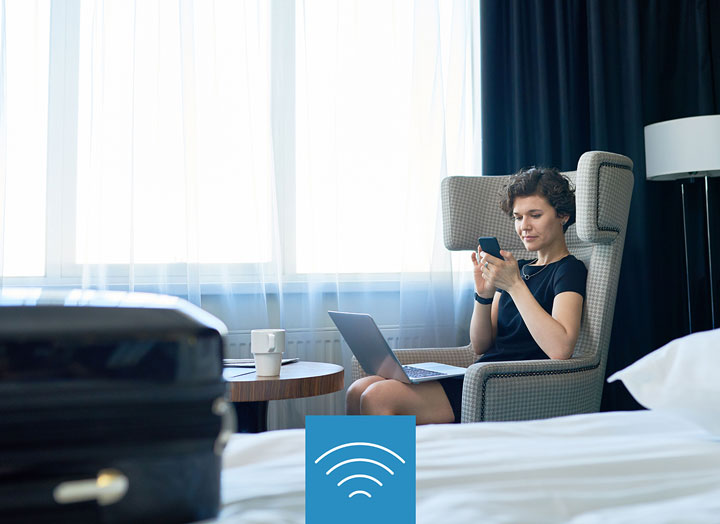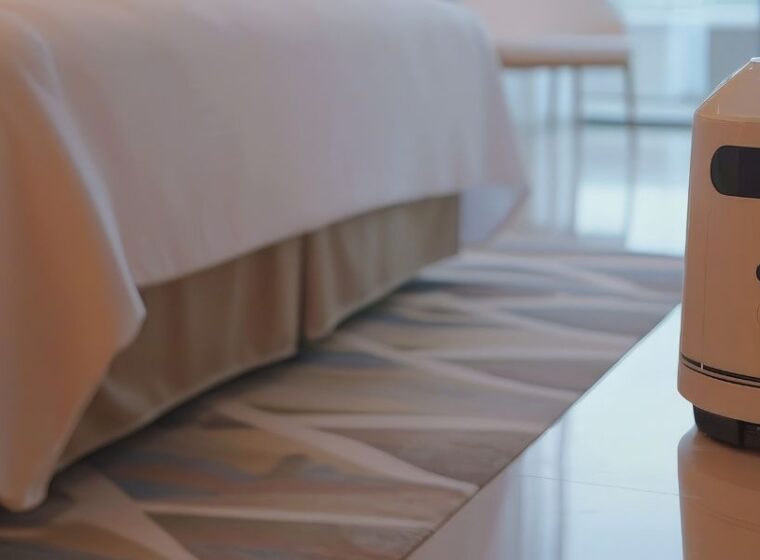Will you adjust your hotel’s High Speed Internet Access (HSIA) pricing structure this year?
As hoteliers prioritize technology investments while reducing costs in other areas, the question of free or fee-based Wifi often comes up.
The answer plays a substantial role in overall guest experience and, ultimately, your hotel’s revenue. As the recent Hospitality Technology Sentiment Survey Report states, “Guests around the globe and across generational groups are demanding an increasingly digital and tech-savvy experience.”
This experience starts before a hotel room is even booked. In a TripAdvisor survey, “46% of respondents said free in-room WiFi is a must-have amenity. If an accommodation didn’t provide it, they would look elsewhere.”
Your WiFi strategy, from how you price your services to how you manage guest expectations, plays a significant role in increasing reservations and overall guest loyalty.
Hotel Guests Expect High Speed Internet Access
As hoteliers, your goal is to deliver an experience that is the same as or exceeds what your guests experience at home. Undoubtedly, the majority of your hotel guests access the internet in their homes, cars, and cell phones. Data from Pew Research shows:
- 73% of American adults have broadband internet service at home
- 37% of Americans stay connected via their smartphone
- Only 10% of Americans don’t use the internet
However, international and business travelers may have further restrictions on their smartphone data plans. So, although visitors may access the internet on their phones, they still presume your hotel offers HSIA. In fact, in as little as seven minutes, guests connect to your WiFi, and one-third of customers request your WiFi password upon arrival.
Slow WiFi or an intermittent signal is disastrous for business and personal travelers facing streaming issues. While it’s possible to manage expectations by clearly displaying speed and download restrictions on your website, many guests don’t realize it’s a problem until they’ve settled in their room.
If your guests can’t connect their devices, then there’s a good chance that they’ll share their concerns on social media and review sites. Not meeting guest expectations harms customer experience. In return, the number of returning guests and new guests may drop.
WiFi Complaints Compound Bad Reviews
Unfortunately, people are more likely to leave a review after a bad experience than after a pleasant experience. When it comes to HSIA, few guests are willing to settle for less. Instead, both business and personal travelers anticipate internet service that’s fast, reliable, and secure. When there’s a failure, then you’ll hear about it in your reviews.
Revinate examined an estimated 53 million reviews and found that “more than two million reviews explicitly mentioned the terms internet, WiFi, or Wi-Fi.” Guests warn about problems of access while poolside or in their rooms. Others remark that the speed resembled dial-up or didn’t meet rates listed on the hotel’s website.
Since consumers shopping for a room often read reviews, negative reports may decrease your total reservations and revenue. A study of more than 23,000 TripAdvisor users shows:
- 81% of travelers always or frequently read reviews before booking a place to stay
- Eight out of 10 users are more likely to book a hotel with a higher bubble rating
Hoteliers Tackle HSIA Concerns
Purposeful hotel WiFi design ensures seamless service. Along with new equipment, hoteliers must meet the expectations of their guests in all aspects. The three areas of most concern to hotel guests, as noted in reviews after their stay, include:
Speed. Regardless if it’s free or paid, users expect WiFi to be easy to connect and immediately begin downloading video content or uploading business data
Reliability. Business and personal travelers use several devices to continuously stream videos or connect with others while at a hotel. An intermittent connection leads to dissatisfaction.
Security. As consumers read and hear about data breaches, increasingly, they are concerned with the security of your system. On Google, a common web search is one that poses the question, “Is it safe to use hotel WiFi?”
Choosing Free WiFi Versus Paid HSIA plans
There is no consensus over which model is the best. But, hoteliers report more technology investment in the upcoming years. Data from the 2019 Lodging Technology Study shows, “54% of hotels are upgrading or changing WiFi suppliers.” Doing so ensures a better customer experience when combined with managing expectations. For instance:
- Hotels may include a note on its website and check-in documents regarding speed during high-volume times
- Hoteliers may offer loyalty program members or business guests HSIA as part of their membership rewards
While some hotels attempt to limit downloads, others insert a fee to lower the cost of hotel-wide HSIA. However, your guests simply won’t settle for anything less than reliable, high-speed internet. Furthermore, hoteliers must work hard to manage expectations and provide transparency. A guest that is caught off-guard by an unexpected charge or can’t stream on multiple devices will respond accordingly via reviews or social media.
Wrapping It Up
As more digital-only generations hit adulthood, hotel guests will increasingly expect High Speed Internet Access in their rooms, your business center, and on hotel grounds. However, upgrading services requires buy-in from hotel stakeholders. Hoteliers can start by surveying customers and examining hotel reviews. Then, deliver executives with data about how this information affects revenue.
Investing funds into HSIA and other consumer-facing technology is only one aspect. The second part is managing customer expectations to ensure the best overall customer experience. When you combine the two areas, your hotel will maximize customer satisfaction and revenue.









